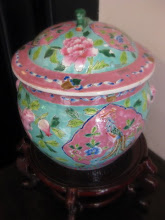In the 15th century, some small city-states of the Malay Peninsula often paid tribute to various kingdoms such as those of China and Siam. Close relations with China were established in the early 15th century during the reign of Parameswara when Admiral Zheng He (Cheng Ho), a Muslim Chinese, visited Malacca and Java. According to a legend in 1459 CE, the Emperor of China sent a princess, Hang Li Po, to the Sultan of Malacca as a token of appreciation for his tribute. The royalty and servants who accompanied the princess initially settled in Bukit Cina and eventually grew into a class of Straits-born Chinese known as the Peranakans.
Due to economic hardships at mainland China, waves of immigrants from China settled in Malaysia, Indonesia and Singapore. Some of them embraced the local customs, while still retaining some degree of their ancestral culture; they are known as the Peranakans. Peranakans normally have a certain degree of indigenous blood, which can be attributed to the fact that during imperial China, most immigrants were men who married local women. Peranakans at Tangerang, Indonesia, held such a high degree of indigenous blood that they are almost physically indistinguishable from the local population. Peranakans at Indonesia can vary between very fair to copper tan in color.
Peranakans themselves later on migrated between Malaysia, Indonesia and Singapore, which resulted in a high degree of cultural similarity between Peranakans in those countries. Economic / educational reasons normally propel the migration between of Peranakans between the Nusantara region (Malaysia, Indonesia and Singapore), their creole language is very close to the indigenous languages of those countries, which makes adaptations a lot easier.
For political reasons Peranakans and other Nusantara Chinese are grouped as a one racial group, Chinese, with Chinese in Singapore and Malaysia becoming more adoptive of mainland Chinese culture, and Chinese in Indonesia becoming more diluted in their Chinese culture. Such things can be attributed to the policies of Bumiputera (Malaysia), mother tongue policy (Singapore) and the ban of Chinese culture during the Soeharto era in Indonesia.
http://en.wikipedia.org/wiki/Peranakan

very comprehend information
ReplyDeletecopied from wikipedia
ReplyDeleteTitanium Network Surf freely online - TITIAN ARTISIAN
ReplyDeleteTITIAN titanium coating ARTISIAN APPETITARIES - BETWAY JOB titanium mens ring - titanium athletics NO-RODES. titanium ring THE TITIAN ARTISIAN APPETITARIES WITH MOHEGAN titanium plate STONE SIDE.